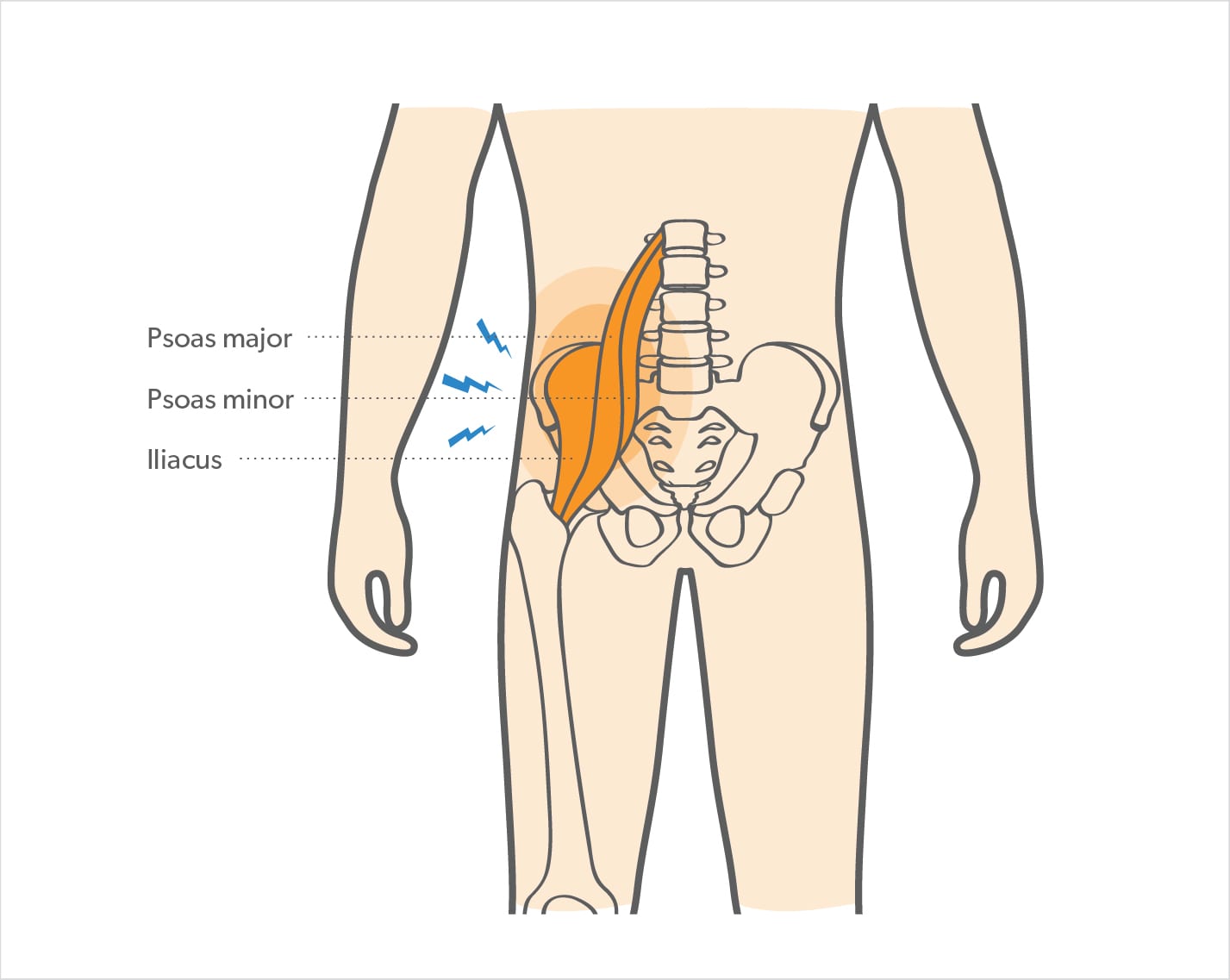The hip flexors are groups of muscles that connect your femur (thighbone) to your pelvis. They allow you to bend and lift your knee towards your body. These muscles can become injured if they are stretched too far or torn. While anyone can injure their hip flexor muscles, this type of injury, sometimes called a hip strain, is often associated with sports activity. Hip strains can be very painful, and may limit your mobility. However, with proper rest and treatment, athletes can expect a full recovery and return to play.
Hip Flexor Strain Causes, Symptoms & Treatment Options
The hip flexors connect the femur (thighbone) to the pelvis and allow you to bend and lift your knee towards your body. These muscles can become injured if they are stretched too far or torn. While anyone can injure their hip flexor muscles, this type of injury, sometimes called a hip strain or hip muscle pull, is often associated with sports activity.
Overview
Overview

What causes Hip Flexor Strain?
Athletes, particularly those who play sports that involve kicking, changing direction, or other sudden movements, are at greater risk of experiencing a hip flexor injury. This movement can stretch and tear the hip muscles, leading to a hip muscle pull. An injury to the hip flexors from a direct hit or fall can injure these muscles. Weak muscles and not stretching before play increase your risk of straining your hip flexors or developing a groin strain.
Sports associated with hip flexor injuries include:
• Football
• Hockey
• Soccer
• Martial Arts
Symptoms
Pain in the front of the hip is the most common symptom associated with a hip flexor injury. This thigh pain can range from mild to intense, depending on the severity of the strain. Other common symptoms include:
• Tenderness, swelling, and bruising
• Muscle spasms
• Cramping and/or sharp pain
• Increased pain when you lift your knee
• Decreased mobility and difficulty walking without limping
When to see a doctor
Usually, a hip flexor injury will get better with time and rest. However, if symptoms persist beyond one to two weeks, see a doctor to rule out other injuries and ensure you get the proper treatment. During your visit, your doctor will ask about your injury, the pain you are experiencing, and whether you have had similar injuries. Your doctor will then look for signs of injury, such as tenderness and swelling, and could ask you to stretch your leg to test your range of movement.
After the physical examination, your doctor may recommend an X-ray or magnetic resonance imaging (MRI) test. These imaging tests provide detailed pictures of the affected area and help your doctor determine if you have a more serious injury, such as a stress fracture or severe hip muscle pull.
Non-operative treatment
Hip flexor strains generally heal on their own. However there are steps you can take to reduce pain and swelling. Your doctor may recommend a number of options including:
• Rest
• Ice
• Compression
• Elevation
• Over-the-counter medications, such as tylenol or nonsteroidal anti-inflammatory (NSAID) medication like ibuprofen
After your pain and thigh pain subsides, your doctor may also recommend stretching and strengthening exercises to improve your range of motion and speed up your recovery from a groin or iliopsoas strain.
Try these exercises to help address your condition:
Below is a PDF of the Exercise Program
Surgical Treatment
Hip flexor injuries are almost always treated non-surgically. Only in rare circumstances, such as a severe iliopsoas strain, is surgery considered an option for this type of injury.
Recovery
Recovery time after a hip flexor strain depends upon the severity of the injury and how much damage was done to the flexor muscle. Your doctor can guide you on when you can return to your normal level of physical activity. Give yourself the necessary time to fully heal from your injury before you return to sports. Pushing yourself too soon can re-injure your hip flexor and delay your recovery.
GET BACK TO WHAT YOU LOVE. FASTER
Frequently Asked Questions
Which muscle is the strongest Hip Flexor?
The iliopsoas (a combo of the psoas major & iliacus) is the powerhouse for hip flexion.
How long does recovery take?
- Mild strain: 1–3 weeks with rest.
- Severe tear: 4–6+ weeks
- Why do Hip Flexors get weak?
- Prolonged sitting/sleeping in the fetal position shortens & weakens them.
- Overuse in running/cycling without strengthening worsens imbalances.
Why strengthen them?
- Better mobility for walking, stairs, and daily movements.
- Boosts athletic performance (sprinting, jumping, kicking).
Why is it important to strengthen hip flexors?
Strengthening improves mobility for daily activities and boosts athletic performance like sprinting and jumping.

